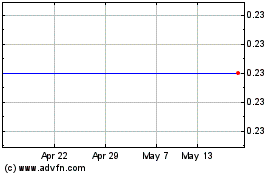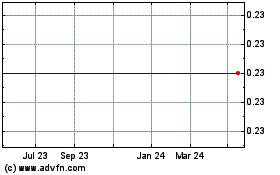Notice of AGM
March 27 2008 - 7:47AM
UK Regulatory
RNS Number:9069Q
Management Consulting Group PLC
27 March 2008
Management Consulting Group PLC (the "Company")
Documents for the Management Consulting Group PLC 2008 Annual General Meeting:
* Annual Report and Accounts 2007
* Articles of Association marked to show the changes being proposed at the 2008
Annual General Meeting by resolution 13
* Revised Articles of Association marked to show the changes being proposed at
the 2008 Annual General Meeting by resolution 14
Copies of the above documents have been submitted to the UK Listing Authority
and will shortly be available for inspection at the UK Listing Authority's
Document Viewing Facility, which is located at:
The Financial Services Authority
25 The North Colonnade
Canary Wharf
London
E14 5HS
Copies of these documents are also available for inspection at the registered
office of the Company until 23 April 2008. The address is:
Management Consulting Group PLC
10 Fleet Place
London
EC4M 7RB
At its upcoming Annual General Meeting, the Company will be proposing the
adoption of new articles of association. These are intended to replace the
Company's current articles of association. The main reason for proposing the
adoption of new articles of association is to take account of changes in UK
company law brought about by the Companies Act 2006.
A summary of the principal changes being introduced by the revised articles of
association is set out below, and is based on the notes to the Notice of Annual
General Meeting 2008:
1. Articles that Duplicate Statutory Provisions
Provisions in the current articles of association (the "Current Articles") which
duplicate provisions contained in the Companies Act 2006 are, in the main, to be
amended to bring them into line with the Companies Act 2006. Certain examples of
such provisions include regulations as to the form of resolutions, the variation
of class rights, the requirement to keep accounting records and provisions
regarding the period of notice required to convene general meetings. The main
changes made to reflect this approach are detailed below.
2. Form of Resolution
The Current Articles contain provisions that specifically require extraordinary
resolutions. These provisions are removed/amended in the new articles of
association (the "New Articles") as the concept of extraordinary resolutions has
not been retained under the Companies Act 2006.
3. Variation of Class Rights
The Current Articles contain provisions regarding the variation of class rights.
The proceedings and specific quorum requirements for a meeting convened to vary
class rights are contained in the Companies Act 2006. The relevant provisions
have therefore been amended accordingly in the New Articles.
4. Convening General Meetings
The provisions in the Current Articles dealing with the convening of general
meetings and the length of notice required to convene general meetings are being
amended to conform to new provisions in the Companies Act 2006. In particular, a
general meeting to consider a special resolution can be convened on 14 days'
notice whereas previously 21 days' notice was required.
5. Votes of Members
Under the Companies Act 2006, proxies are entitled to vote on a show of hands
whereas, under the Current Articles, proxies are only entitled to vote on a
poll. Multiple proxies may be appointed provided that each proxy is appointed to
exercise the rights attached to a different share held by the shareholder.
Multiple corporate representatives may be appointed. The New Articles reflect
these provisions.
6. Age of Directors on Appointment
The Current Articles contain a provision requiring a director's age to be
disclosed if he has attained the age of 70 years or more in the notice convening
a meeting at which the director is proposed to be elected or re-elected. Such
provision could now contravene the Employment Equality (Age) Regulations 2006,
and so has been removed from the New Articles.
7. Conflicts of Interest
The Companies Act 2006 sets out directors' general duties which largely codify
the existing law but with some changes. Under the Companies Act 2006, from 1
October 2008 a director must avoid a situation where he has, or can have, a
direct or indirect interest that conflicts, or possibly may conflict, with the
company's interests. The requirement is very broad and could apply, for example,
if a director becomes a director of another company or a trustee of another
organisation. The Companies Act 2006 allows directors of public companies to
authorise conflicts and potential conflicts, where appropriate, where the
articles of association contain a provision to this effect. The Companies Act
2006 also allows the articles of association to contain other provisions for
dealing with directors' conflicts of interest to avoid a breach of duty. The New
Articles give the directors authority to approve such situations and to include
other provisions to allow conflicts of interest to be dealt with in a similar
way to the current position.
There are safeguards which will apply when directors decide whether to authorise
a conflict or potential conflict. First, only directors who have no interest in
the matter being considered will be able to take the relevant decision, and
secondly, in taking the decision, the directors must act in a way they consider,
in good faith, will be most likely to promote the company's success. The
directors will be able to impose limits or conditions when giving authorisation
if they think this is appropriate.
It is also proposed that the New Articles should contain provisions relating to
confidential information, attendance at board meetings and availability of board
papers to protect a director being in breach of duty if a conflict of interest
or potential conflict of interest arises. These provisions will only apply where
the position giving rise to the potential conflict has previously been
authorised by the directors.
8. Notice of Board Meetings
Under the New Articles, a director absent or intending to be absent from the
United Kingdom may request that notices of board meetings during his absence be
sent to him in hard copy form or by electronic means to an address or electronic
address given by him to the Company for that purpose. If no request is made (and
/or if no such non-United Kingdom address is given) it is not necessary to give
notice of a board meeting to a director who is absent from the United Kingdom.
9. Electronic and Web Communications
Provisions of the Companies Act 2006 which came into force in January 2007
enable companies to communicate with members by electronic and/or website
communications. The New Articles continue to allow communications to members in
electronic form and, in addition, they also permit the Company to take advantage
of the new provisions relating to website communications. Before the Company can
communicate with a member by means of website communication, the relevant member
must be asked individually by the Company to agree that the Company may send or
supply documents or information to him by means of a website, and the Company
must either have received a positive response or have received no response
within the period of 28 days beginning with the date on which the request was
sent. The Company will notify the member (either in writing, or by other
permitted means) when a relevant document or information is placed on the
website and a member can always request a hard copy version of the document or
information.
10. Directors' Indemnities and Loans to Fund Expenditure
The Companies Act 2006 has in some areas widened the scope of the powers of a
company to indemnify directors and to fund expenditure incurred in connection
with certain actions against directors. In particular, a company that is a
trustee of an occupational pension scheme can now indemnify a director against
liability incurred in connection with the company's activities as trustee of the
scheme. In addition, the existing exemption allowing a company to provide money
for the purpose of funding a director's defence in court proceedings now
expressly covers regulatory proceedings and applies to associated companies.
11. General
Generally the opportunity has been taken to clarify certain provisions of the
New Articles.
Enquiries
Management Consulting Group PLC
Charles Ansley Company Secretary 020 7710 5000
This information is provided by RNS
The company news service from the London Stock Exchange
END
NOAFKOKQDBKDANB
Management Consulting (LSE:MMC)
Historical Stock Chart
From Jun 2024 to Jul 2024

Management Consulting (LSE:MMC)
Historical Stock Chart
From Jul 2023 to Jul 2024
